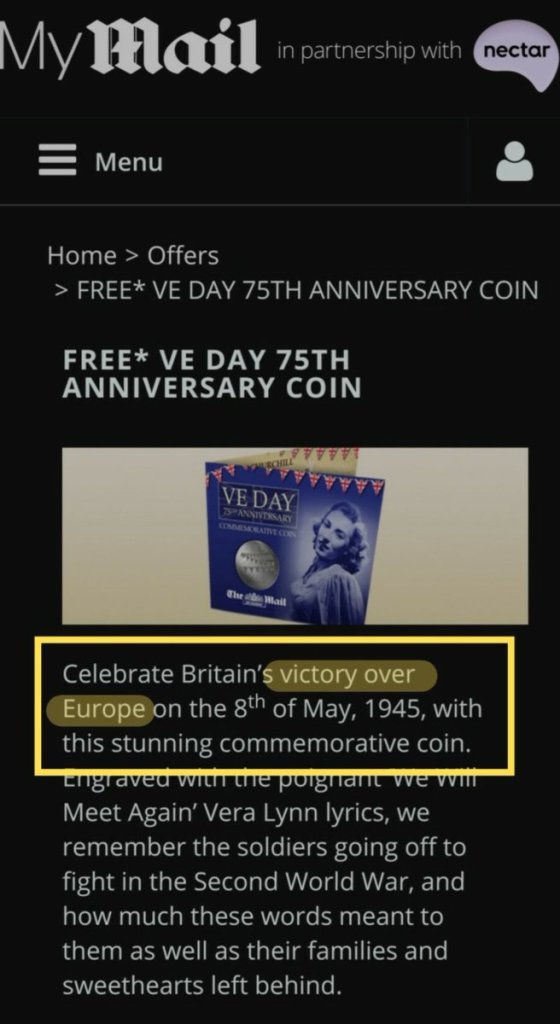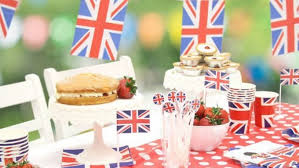Somehow the impending anniversary of VE Day had not impinged on my consciousness. I didn’t get the memo about the Mayday bank holiday being shifted to Friday so we could commemorate the end of WWII in Europe.
And I’m deeply uneasy about it. We’re in the midst of a crisis which, as we are reminded daily, is the toughest thing we’ve had to face since the last war. And it’s by no means over. We are assured that the infection has ‘passed the peak’ but people are still dying and the dying will continue for some time yet. Street parties – even physically distanced ones – surely aren’t quite capturing the mood. And the more cynical amongst us may suspect that this anniversary is giving government an opportunity for distraction – remind us of our finest hour, whilst offering us only spin and tweaked stats and pieties in place of decisive, timely and compassionate action.
And there’s more to my unease. Are we marking the defeat of a genocidal fascist dictatorship which had brought about the deaths of millions, not just soldiers, or civilian casualties of bombing, but people targeted for death because they were Jewish, Communist, Roma, homosexual, disabled? Are we marking the fact that in the wake of this horror, Europe forged a peace and a unity that has held ever since?
Or are we celebrating because ‘we’ defeated ‘them’? Because Churchill was the Boris of his day, facing down an enemy with British pluck and bulldog spirit? Just to illustrate my concerns:

What did the end of that war really mean for us here in Britain, and for our neighbours in Europe? Primarily, I would guess, for the British, it was relief. Relief that they no longer had to listen for the sirens, or listen for when the V1 engines cut out. Relief that nights in shelters or underground stations, waiting for the All Clear, were at an end. The prospect of life returning to some semblance of normality, or to what we would now call a ‘new normal’. The prospect of the return of the people they loved who had been serving in Europe, and the relief those people were no longer in daily peril.
But even then, it was tempered with the reality of loss. The gaps on the streets where houses used to stand, where families had lived. The people who would never come home, or who came home unutterably changed and damaged.
And the new normal had to accommodate – not right away, but soon – the full knowledge of what had happened ‘over there’. For those who’d arrived in the UK as refugees, there was the terrible wait for knowledge – and then the terrible weight of knowledge. Some returned to their families, if not to home, unutterably changed and damaged, and those to whom they returned had to wrestle not only with grief but the guilt that they had been spared, and the impossibility of truly understanding.
Across Europe, if not here, people had been starving – not just in the camps but in bombed-out cities, occupied territories. People now were sick, not just in the camps but across the continent, because of malnutrition and the breakdown of infrastructure in cities, towns and villages that had become rubble.
The thing is, VE Day didn’t mean it was all over (and not just because a brutal war continued in the Pacific, for another three months). For many it was never over. They may not have talked about it, often or at all, but it stayed with them. The survivors of the camps, the soldiers who liberated the camps, those who survived but saw more cruelty and destruction than their souls could bear. It may seem as if the war is being invoked all the time, especially at present, but rarely by those who really remember it, who were actually there.
I can’t mark VE Day with little flags and Vera Lynn and Keep Calm and Carry On. I mark this 75th anniversary by remembering the cost, remembering the loss and the pain and the destruction. And by remembering how Europe rebuilt and repaired, not only buildings and roads and ports, but alliances and communities and trust. I will think of victory in Europe, and the victory of Europe as an ideal of peaceful cooperation. Any VE day celebration that does not celebrate Europe is a sham, a fantasy of Little England, standing alone (apart from the Polish airmen, and the troops from across the Empire, and the Yanks, and the Red Army and the Free French and…), a myth that we use to bolster our sense of exceptionalism and our perverse decision to actually stand alone now.
Of course people celebrated 75 years ago. In that giddy moment of relief and release, they sang and danced and drank and kissed unsuitable strangers. It wasn’t all partying. There was joy, and pride in the courage and fortitude of soldiers and resistance fighters who had dared so much and won. There was hope that now things would be better. But as Frank Capra says in It’s a Wonderful Life, made in 1946, on VE Day they ‘wept, and prayed’.
75 years on, we can recapture neither the giddy relief nor the raw sorrow. We have a different perspective, inevitably. We know so much that they didn’t, about what happened during the war, and what came after. Our commemoration must be honest and clear-sighted, not sentimental.
The hope that VE Day brought was not just the hope of being reunited with loved ones. It was the hope of lasting peace, the hope that with peace would come the chance to build a better, fairer society. That hope led to the European Community, to legislation to protect individuals and communities against prejudice and discrimination, to the UN and its role in establishing and protecting human rights worldwide. As imperfect as those protections are, they emerged directly from the victory we are commemorating tomorrow.
Here, it led to the creation of the welfare state and the NHS. If we really understand what VE Day meant, perhaps this anniversary will help us to see how a better, fairer society could emerge once we’re all able to emerge from our quarantine. Perhaps.
With respect and gratitude to all of those who fought and died to defeat Nazism, with deep sorrow to all of those engulfed by the barbarity, those who were murdered, those who survived, those who lost so much.
Let us commemorate, by all means. But most of all, let us learn. Because if we do not learn from this bitter victory, night might fall again.






#1 by Sharon on May 8, 2020 - 3:13 am
Could not agree more, a wonderful post.
LikeLike
#2 by cathannabel on May 8, 2020 - 8:32 am
Thank you Sharon
LikeLike
#3 by barleybooks on May 8, 2020 - 10:27 pm
Thank you. I agree with everything you’ve said here.
LikeLike
#4 by cathannabel on May 9, 2020 - 8:31 am
Thanks.
LikeLike